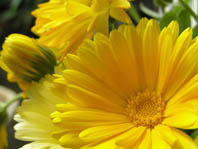Calendula Herb

Calendula is a hardy annual first used by Indian and Arabic herbalists in rejuvenation formulas. Botanists know it as Calendula officinalis, but most gardeners simply refer to it by its common name, marigold. Native to the eastern Mediterranean, this brightly colored flower is now grown around the world.
The ancient Egyptians valued calendula for its alleged rejuvenation properties while their Greek contemporaries used the brightly colored petals as a culinary garnish. In India, calendula blossoms were woven into wreaths which were used to decorate images of the various gods and goddesses. More recently, Civil War doctors reportedly used the leaves to treat open wounds on the battlefield.
Calendula as Medicine
Calendula is in the same botanical family as arnica and is used in situations where arnica is unavailable or inappropriate. Modern herbalists use calendula poultices for bruises, impetigo, varicose veins and minor burns. Ointments containing calendula are used for chapped lips, bedsores and shingles. Calendula can also be made into a weak infusion and used as an eyewash for conjunctivitis or as a mouthwash for thrush.
Calendula sap, which is taken from the stem, is reputed to be an effective callus remover. Old herbal texts recommend applying calendula sap directly to calluses, corns and warts.
When taken internally, calendula is believed to enhance bile production, assist digestion and minimize flatulence. Calendula tea was a pre-Civil War era remedy for nausea, headache, fever and menstrual cramps.
Cautionary Notes
Calendula has been used for centuries with few problems. Animal testing seems to show that calendula does have some healing properties but hasn't yet been exhaustively studied on people. When using calendula for herbal purposes, it's important to make sure that you're using authentic Calendula officinalis and not one of the ornamental marigolds like Tagetes patula or T. erecta.
Herbalists generally agree that calendula shouldn't be used internally during pregnancy or lactation. Of course, it's always a good idea to discuss any herbal medicines with your physician.
|